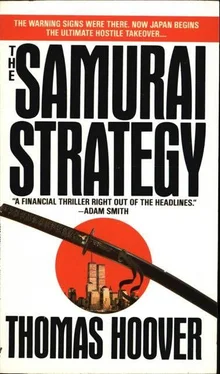Thomas Hoover - The samurai strategy
Здесь есть возможность читать онлайн «Thomas Hoover - The samurai strategy» весь текст электронной книги совершенно бесплатно (целиком полную версию без сокращений). В некоторых случаях можно слушать аудио, скачать через торрент в формате fb2 и присутствует краткое содержание. Жанр: Триллер, на английском языке. Описание произведения, (предисловие) а так же отзывы посетителей доступны на портале библиотеки ЛибКат.
- Название:The samurai strategy
- Автор:
- Жанр:
- Год:неизвестен
- ISBN:нет данных
- Рейтинг книги:5 / 5. Голосов: 1
-
Избранное:Добавить в избранное
- Отзывы:
-
Ваша оценка:
- 100
- 1
- 2
- 3
- 4
- 5
The samurai strategy: краткое содержание, описание и аннотация
Предлагаем к чтению аннотацию, описание, краткое содержание или предисловие (зависит от того, что написал сам автор книги «The samurai strategy»). Если вы не нашли необходимую информацию о книге — напишите в комментариях, мы постараемся отыскать её.
The samurai strategy — читать онлайн бесплатно полную книгу (весь текст) целиком
Ниже представлен текст книги, разбитый по страницам. Система сохранения места последней прочитанной страницы, позволяет с удобством читать онлайн бесплатно книгу «The samurai strategy», без необходимости каждый раз заново искать на чём Вы остановились. Поставьте закладку, и сможете в любой момент перейти на страницу, на которой закончили чтение.
Интервал:
Закладка:
Another major player is Daiwa Securities America, which also underwrites federal paper on its own. Nor should we overlook Nikko Securities and Yamaichi Securities, both handling money in the tens of billions. These outfits and others are well past the beachhead stage of entry into the world capital markets. They're entrenched; they're big; and they know how to play hardball. Were they involved in Noda's assault? Nobody ever knew for sure. But you figure it out.
Banks. As it happens, the biggest one in the world is Japanese. The Dai-Ichi Kangyo Bank, Ltd. of Tokyo has unceremoniously reduced Citicorp to second banana. Rounding out the top five worldwide are Fuji, Sumitomo, and Mitsubishi. And worldwide means everywhere. Japan controls ten percent of the U.S. banking business, a quarter of all British banking. Of the ten largest banks in the sovereign state of California, four are Japanese. Japan in brief has become banker to the world, with more ready money than anybody else, and it also has a battalion of financial samurai who know the game.
What makes these Japanese players especially powerful is the kind of bucks they represent. It's called hot money-cash lent out short-term and therefore subject to immediate withdrawal. Instead of tying up their overseas bankroll for years, they stick to offshore investments that can be called in tomorrow. At home Japan invests for the long horizon, but abroad the bulk of the money is short. Hot money.
Since foreign investors normally pick up well over half of a given Treasury refunding, the paralysis when Japan began recalling its hot money, thereby spooking buyers worldwide, was as predictable as the sunrise. Matsuo Noda didn't have to be a Rhodes Scholar to realize how much mileage there'd be in a big Japanese sell-off program and a "no comment" from his dealers.
Here's how he orchestrated the details. Apparently it had all been very Japanese, very consensus. A few phone calls, then a lot of meetings over green tea. Later on, some late nights with sake. Noda, thanks to his new clout, had been in the driver's seat from the start. The money managers in Tokyo were all feeling the heat over demands by investors that they participate in the multiple Eight-Hundred-Year funds he'd floated. All across Japan people were starting to ask whether their savings were out there waving the flag too. A lot of those managers were starting to get edgy, so Noda thoughtfully struck a deal, a little consensus.
Okay, hold your monies, but let's get organized. When the next Treasury collection plate comes by, don't roll over any more short-term U.S. T-bills and don't take a piece of the next sale of long bonds. In fact, that's the day you begin to divest. Staggering losses? No problem. I just happen to have everybody's portfolio insulated with futures contracts. Sell away, and even when the price plummets, nobody's gonna lose a yen. In fact, you can have a piece of the currency windfall I've set up. Apparently everybody shook hands on it, or whatever they do in Japan nowadays.
Consequently none of the big Japanese houses in New York had to take a lot of risk. The sellers were covered by Noda's rate contracts, which I later discovered he'd passed along (at cost) to anybody who needed them. The rest he sold himself for a hefty profit. So in the course of his play, he incidentally raised several billions in additional operating capital for Dai Nippon while fully protecting the home team.
When the dust had finally settled, it turned out he didn't actually liquidate very much Treasury paper after all. He didn't need to. In fact Japan dumped only about eight percent of its holdings. If you think about it a minute you realize they couldn't possibly have hoped to divest everything they had in dollars. What would they do with all that cash? Loan it to Brazil?
Veterans of world finance will tell you there were already precedents for this kind of Japanese muscle. Back in the mid- eighties, Nomura Securities had unsheathed its financial sword and totally controlled the Eurobond markets for about a fortnight. They were just letting everybody know they were in town. So there was nothing particularly unprecedented about a little number whereby a handful of Japanese banks and securities firms could, by concerted action, bring the U.S. financial system to its knees.
Although I'd been convinced from the very first that Matsuo Noda had engineered the whole move, I had no hard proof. Besides, what was I supposed to do? No laws were broken. He was playing strictly by the rules. So I just took cover like everybody else and watched the marketplace disintegrate. My main preoccupation was a growing suspicion that Noda was now moving up his battery of guns for the next round of shelling.
I was right. His Treasury sell-off had merely been a demonstration of firepower. Its effectiveness must have given confidence that his beachhead was secured, since he came ashore at the end of the week to take personal command of the real landing.
He and his general staff hit town quietly and with no fanfare on Thursday, spent Friday in a strategy session, and on Saturday took over the computerized command HQ on Third Avenue. That afternoon Tanaka called and ordered me (very politely but curtly) to assemble my records and come uptown. The operation was being consolidated and Noda-san wanted me coordinated. From now on I would be working out of their offices.
This was it. Just what I'd been waiting for. At last I could confront the bastard, one-on-one. No way was I going to be part of the big assault I saw directly ahead.
My first look at the revised operation uptown confirmed my worst fears. The technical analysts had been replaced by a new set of troops: money men. Open collars were gone, supplanted by a lot of business-school types wearing thin black ties. Tanaka's office had been moved off to the side; the corner office now belonged to Dai Nippon's four-star commanding general: Matsuo Noda. After I'd cleared security, that's where I was led.
"Mr. Walton, how good to see you again." He looked up from a printout, his silver hair perfectly groomed. "I do hope today is convenient for you."
"This is going to be brief." I ignored the chair he rose to adjust for me. "I'm only here to advise you that my participation is officially terminated as of this moment. I'll be sending you a final invoice next week. You can find yourself another attorney."
"But your work has scarcely begun." He appeared to be mildly puzzled, as though I'd just made a small misstatement about the weather or some such. "We expect your participation to be crucial."
"Surely you're joking." I was turning to leave.
"Mr. Walton." He shifted the printout around and shoved it across the desk. "Contrary to what you may presume, we are here to help this country. You might wish to look over our program for the near term."
"This I've got to see." I came back and studied it for a few seconds… then stared back at him.
"Impossible." I finally realized he was serious. "Whatever you're thinking, I'll tell you right now you don't have a chance. These outfits have lawyers. Hundreds of them."
"Ah, but that's why you are on our staff. This is your specialty." He smiled. "Remember the Book of Five Rings by the swordsman Miyamoto Musashi? In it he describes the three kinds of attack. There is the Ken no Sen, where you move first and catch your opponent unprepared; next is the Tai no Sen, whereby your initial move occurs a split second after your opponent's; and finally there is the Taitai no Sen, in which you and he attack at the same instant. What has happened up until today might be likened to the Ken no Sen. We have made sure that nothing was anticipated. Very soon, however, we will have to move to the Tai no Sen, responding with lightning speed to the moves of those who would thwart us. Miyamoto Musashi declared correctly that if you are attacked with force, you must counterattack with even greater force and thereby upset momentarily your opponent's rhythm. That moment can mean victory, but only if you are totally prepared." He leaned back. "We must be totally prepared."
Читать дальшеИнтервал:
Закладка:
Похожие книги на «The samurai strategy»
Представляем Вашему вниманию похожие книги на «The samurai strategy» списком для выбора. Мы отобрали схожую по названию и смыслу литературу в надежде предоставить читателям больше вариантов отыскать новые, интересные, ещё непрочитанные произведения.
Обсуждение, отзывы о книге «The samurai strategy» и просто собственные мнения читателей. Оставьте ваши комментарии, напишите, что Вы думаете о произведении, его смысле или главных героях. Укажите что конкретно понравилось, а что нет, и почему Вы так считаете.












